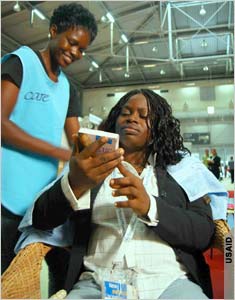
11 February 2011
U.S. Seeks to Cut Costs in Sustained War Against HIV/AIDS

Washington — The U.S. government is preparing for a sustained war against HIV/AIDS.
At a gathering of international health experts in Washington February 10, the Obama administration official in charge of the anti-HIV/AIDS campaign, Dr. Eric Goosby, said the watchword in the campaign has become “sustainability” — rather than “emergency” — and the key is reaching more people while reducing costs.
Since PEPFAR (the President’s Emergency Plan for AIDS Relief) was launched in 2003, the cost of administering anti-retroviral drugs (ARVs) to one patient has fallen from $1,400 per year a few years ago to an average of $435 per patient per year now, Goosby said. The former medical director of the AIDS clinic of the San Francisco General Hospital now heads the global AIDS office at the U.S. State Department.
In the first five years of PEPFAR, ARVs reached 1.7 million people as funding shot upward from $2.3 billion in 2003 to $6 billion in 2008, Goosby said. But because of budgetary constraints that have come with the global recession, funding increases to combat the disease have flattened out. In 2009, the Obama administration spent $6.7 billion and in 2010, $6.8 billion for PEPFAR. Nevertheless, the number of people receiving ARVs has mushroomed from 1.7 million in 2008 to 3.3 million through the end of 2010.
Goosby said that PEPFAR has a special focus on children.
“In the last year alone, we have been able to prevent 114,000 transmissions to children during pregnancy of HIV-positive mothers,” he said, adding that 3.8 million vulnerable children are cared for by PEPFAR programs. “From birth until they are 18 years old, we feed them, clothe them, house them, educate them, train them for jobs and turn them loose, and we have a case management relationship with them as they go into young adulthood. This is a remarkable example of the American people’s tax dollars having a high impact to stabilize lives and save lives, stabilize communities and stabilize countries.”
“Despite funding constraints, the number of people receiving treatment is increasing rapidly,” said Dr. Charles Holmes, PEPFAR’s chief medical officer.
As the United States prepares for a long-term campaign against the disease that destroys the body’s immune system, Goosby said making health management systems more efficient is the core theme. “It’s not flashy or sexy, but it has a huge monetary impact. We want to have one manager for 20 clinics, not 20 managers for 20 clinics. We want to have one procurement system for 20 clinics, not one procurement system for each clinic,” he said.
Goosby said the international community needs to do more to support the anti-AIDS struggle, and said he hopes to see greater contributions from European countries, China and Saudi Arabia, among others. PEPFAR, he said, is engaging faith-based charities operating in AIDS-stricken countries as another measure to broaden its partnerships and cut costs.
“When the PEPFAR efforts move out of cities into rural areas, medical facilities thin out and people are more dependent on nonprofit groups. We have taken full advantage of that, especially with faith-based organizations,” Goosby said.
The end goal of PEPFAR is to enable health ministries in AIDS-affected countries to take control of the efforts to counter the epidemic.
“The unifying thread is having a ministry of health that is strong enough to take the reins so that they are able to plan effectively, define and prioritize unmet needs, then move to implement the program,” he said. “We are making a permanent system of care embedded in the existing ministries of health that will be there long after PEPFAR is gone.”
Dr. Ndwapi Ndwapi of Botswana said he is taking many ideas from the conference to make his country’s anti-AIDS programs more effective.
“The emphasis on cost control, knowing how much things cost, going into the details, looking at those areas that are most costly and finding interventions, such as the procurement of ARV drugs, a strategy that South Africa is undertaking. I look at them with great interest,” Ndwapi said.
Ndwapi said it is urgent for the Botswana Health Ministry to bring down costs and develop a self-sustaining program because international donors are beginning to send their anti-AIDS funds to other countries deemed to be in greater need.
(This is a product of the Bureau of International Information Programs, U.S. Department of State. Web site: http://www.america.gov)
